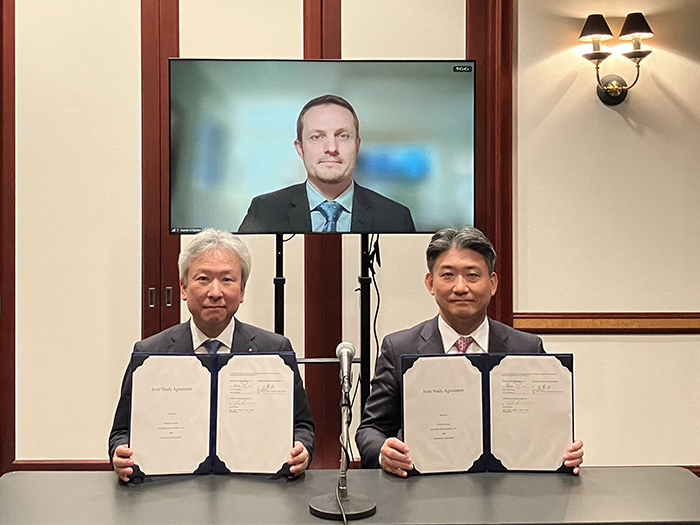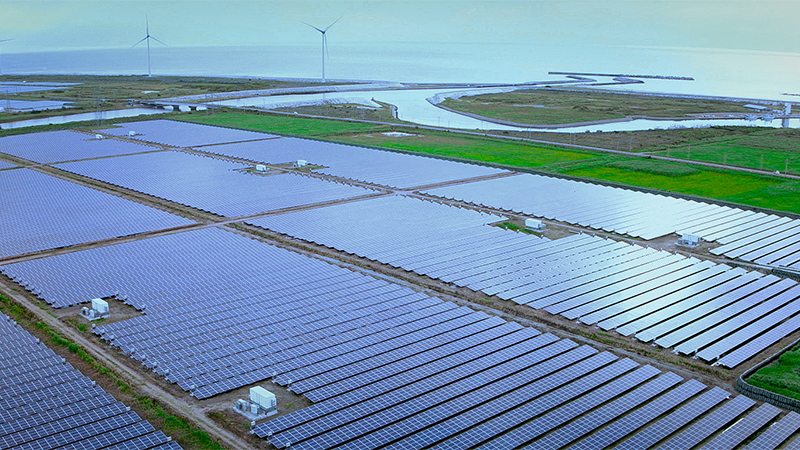Oct. 11, 2024
Sumitomo Corporation
Kawasaki Kisen Kaisha, Ltd.
Hilcorp Alaska
Signed a Joint Study Agreement for CCS Feasibility Study in Alaska, USA- First feasibility study for Japanese companies for realizing Cross-Border CCS between Japan and the United States -
Sumitomo Corporation, Kawasaki Kisen Kaisha, Ltd. (“K” LINE) and Hilcorp Alaska (Hilcorp) have agreed to conduct a feasibility study of CCS (*1) in Alaska, USA, and have signed a joint study agreement between the three companies. This feasibility study will involve the three companies investigating a feasibility for aiming at building a CCS value chain in which CO2 is aggregated in Japan, transported by large-sized liquefied CO2 vessels to Alaska, the United States for sequestration/storage. This will be the first time for a Japanese company to conduct a joint study between Japan and the U.S. toward the commercialization of cross-border CCS, and the three companies aim to commercialize it in cooperation with the Japanese and U.S. governments. On October 11, 2024, the "4th Japan-U.S. CCUS (*2) Working Group", co-hosted by the Ministry of Economy, Trade and Industry (METI) and the U.S. Department of Energy (DOE), was held. Taking advantage of this opportunity, a signing ceremony for the joint study agreement related to this feasibility study was conducted in the presence of both the Japanese and the U.S. governments.
The Japanese government is promoting the improvement of the business environment to initiate CCS projects by 2030 (*3). In response to this policy, in April 2024, the fact sheet (*4) of the Japan-U.S. Joint Leaders’ Statement stated that the two countries would evaluate the potential for cross-border carbon dioxide transport and storage hubs between Japan and Alaska. While the governments of Japan and the United States are considering the feasibility of CCS in Alaska, Sumitomo Corporation, “K” LINE and Hilcorp have decided to conduct this joint study including the establishment of a CCS value chain between Japan and Alaska and the examination of CO2 storage potentials in Alaska. Specifically, each company will use its own knowledge and experience to conduct technical research on CO2 storage including storage capacity, research on technical requirements for liquefied CO2 vessels, and review the business environment in order to explore the feasibility of this project.
Oil and gas field development has been underway in Alaska, USA, since the 1950s, and the total storage capacity of the CCS project is expected to be 50 gigatons (*5), equivalent to Japan's CO2 emissions over 50 years. Alaska is recognized as a promising base for CCS projects, not only because the data accumulated through oil and gas development can be used for CO2 storage, but also because it has existing infrastructure such as LNG terminals, port facilities, and pipelines. We will contribute to carbon neutrality through the development of carbon management technology between the two countries.

Comment on this initiative
Sumitomo Corporation
Sumitomo Corporation Group has positioned "mitigation of climate change" as one of the important social issues and is taking on the challenge of achieving carbon neutrality and a sustainable energy cycle by 2050. Sumitomo Corporation sees CCUS as one of its important measures, and by promoting businesses that contribute to Japan's decarbonization through public-private partnerships, it aims to contribute to improving the sustainability of domestic industries and increase the corporate value of its group.
“K” LINE
“K” LINE Group is promoting a variety of initiatives to support the low-carbon and carbon-free of its own operations and society in accordance with its long-term environmental policy, “Environmental Vision 2050’’. In the field of CCS, the group plans to start the world's first full-scale carbon capture and storage (CCS) transport from next year. It is expected that liquefied CO2 carriers will sequentially begin to operate in Japan and overseas in the future. “K” LINE will incorporate knowledge acquired from operations, including this study, into its future development of businesses with the aim of realizing a sustainable society and increasing its corporate value.
(*1) CCS
Carbon Capture and Storage. To capture and store CO2 emitted from industrial activities, etc.
(*2) CCUS
Carbon Capture, Utilization and Storage. To capture, store and utilize CO2 emitted from industrial activities, etc.
(*3) "Basic Policy for the Realization of GX" (Released as of Feb 10th, 2023 by Ministry of Economy, Trade and Industry, JAPAN):
https://www.meti.go.jp/english/press/2023/0210_003.html
(*4) FACT SHEET: Japan Official Visit with State Dinner to the United States (announced by the Ministry of Foreign Affairs on April 10, 2024):
https://www.mofa.go.jp/mofaj/files/100652149.pdf
(*5) Estimated by the Government of Alaska:
Governor Dunleavy introduces carbon management and monetization bills creating Statutory Structures - Mike Dunleavy (alaska.gov)



